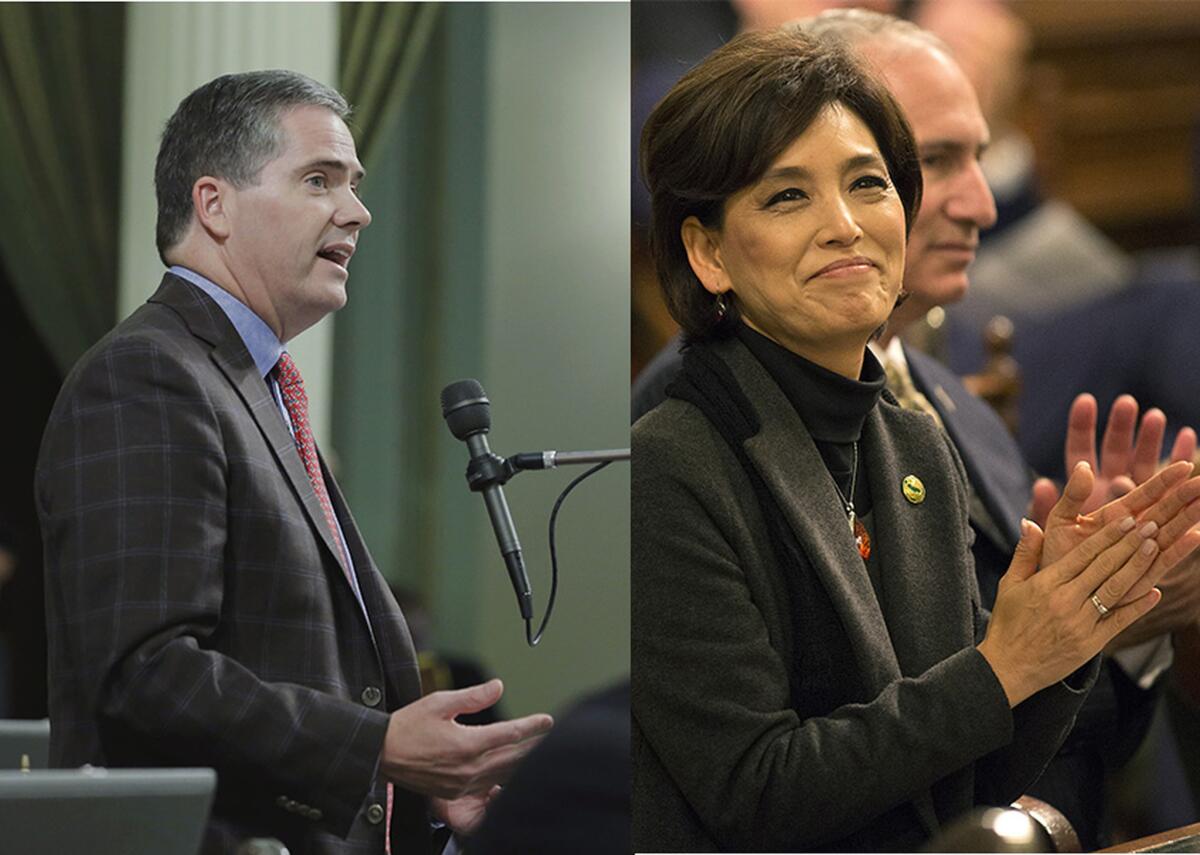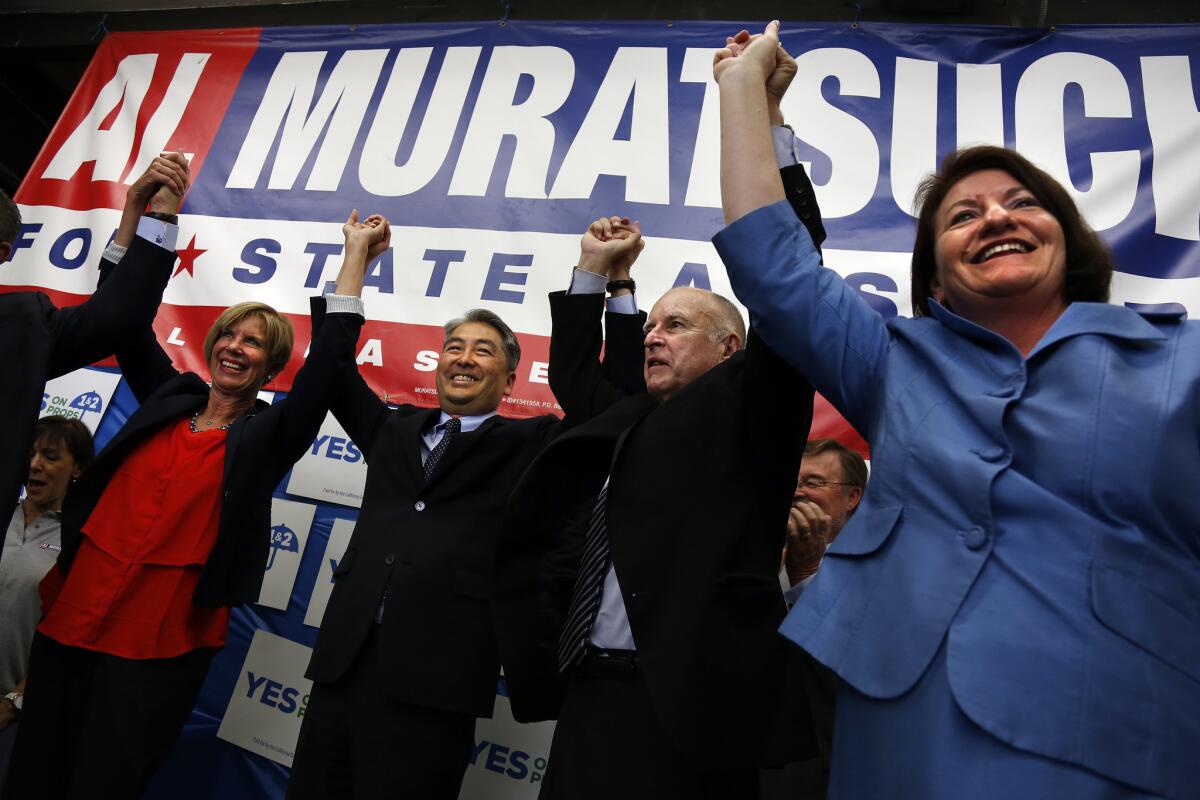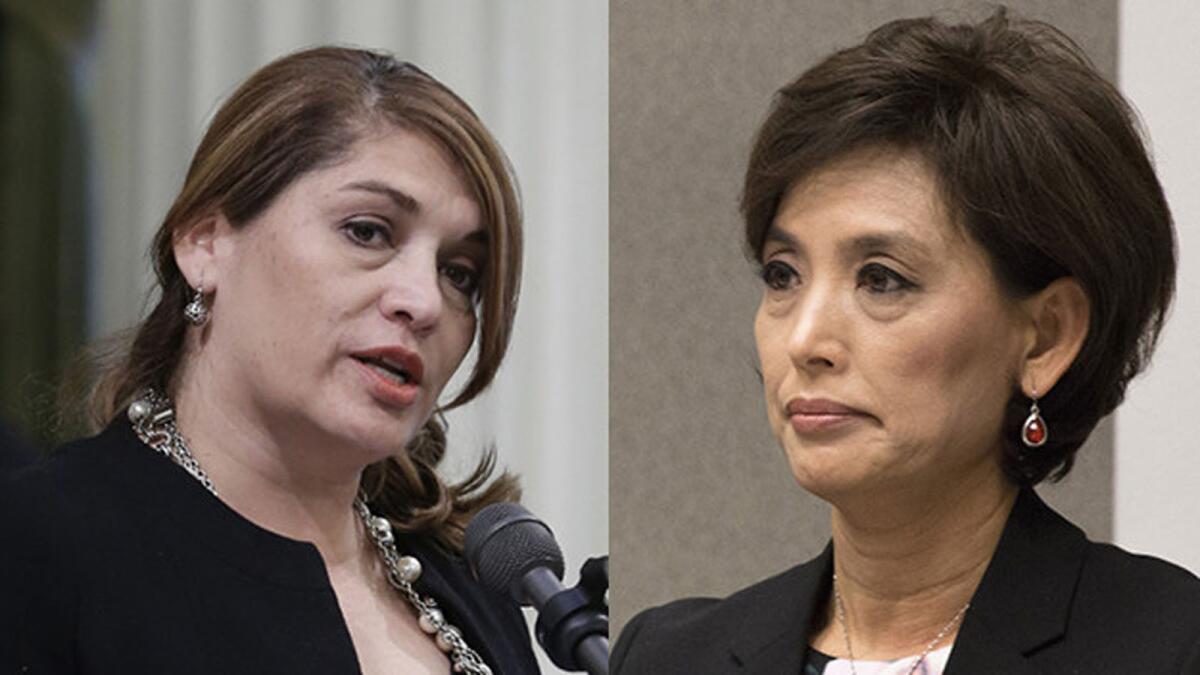Will these Southern California Republicans keep their Assembly seats despite Trump?

A couple years ago, a nationwide Republican tidal wave that gave the GOP control of Congress showed up on a smaller scale on California’s shores: A handful of Republican incumbents wrested away swing districts from Democrats, blocking them from a supermajority in the state Legislature.
This year, those first-term GOP lawmakers are facing the prospect of losing their seats in what their opponents hope will be a move in the opposite direction spurred on by a focus on Republican presidential nominee Donald Trump.
A few months ago, Democratic hopefuls linked Trump to their Republican opponents throughout the state in ads for congressional campaigns down to county supervisor races. But will the tactic carry them through November and help them win back their former seats? Two Southern California Republican incumbents are about to find out.

In Orange County, Assemblywoman Young Kim (R-Fullerton) is in a rematch with Democrat Sharon Quirk-Silva, a public school teacher who lost the seat in 2014. Assemblyman David Hadley (R-Manhattan Beach), the only Republican in the Assembly whose district lies entirely within L.A. County, also faces a repeat foe in Al Muratsuchi, a Democrat who lost by just 700 votes last cycle.
Both challengers have tried mightily to link Trump to their Republican opponents, hoping Californians’ unfavorable opinions of the presidential nominee might sway a close race. It’s an unorthodox tactic to tie a state race to a presidential campaign but, political consultants say, this is turning out to be an unorthodox year.
“It is unusual that you would tie your Assembly race to a presidential contest, absolutely, it’s totally out of the blue,” said Fred Smoller, a political science professor at Chapman University in Orange. “But in this presidential contest, it makes sense.”
Negative perceptions of Trump are so high, particularly among Californians, Smoller said, that foisting his image on unwilling opponents is worth a try, especially in the close races that Hadley and Kim both face. In the latest Field poll, nearly seven in 10 likely California voters held a negative view of Trump.
“The cold, hard reality is that Donald Trump is toxic and it would be political malpractice to any Democrat down-ballot to not capitalize on or take advantage of the Trump effect,” said Dave Jacobson, a Democratic consultant involved with several legislative races this year.
In Orange County, Quirk-Silva’s campaign has highlighted her support for public schools and is trying to combat perceptions that she won’t protect Proposition 13, the state’s property tax law. Quirk-Silva’s campaign has also repeatedly demanded that Kim, 53, release her tax returns, borrowing a page from Hillary Clinton’s playbook, and has likened Kim’s refusal to do so to Trump’s actions.
During the June primary, Democrat Quirk-Silva bested the incumbent by a margin of 54-46, almost reversing the outcome of their last matchup in 2014.
In an interview, Quirk-Silva said voters deserve to know that the Orange County Republican Party, which has endorsed Kim, is also backing Trump.
“If she doesn’t support him than why hasn’t she denounced him?” Quirk-Silva said.
Kim, who supports charter schools and has support from business groups, says she’s focused on talking to voters about her record in office, including voting against tax increases and introducing legislation to freeze tuition at California’s public colleges and universities while Prop. 30 remained in effect. She says she believes voters will evaluate her based on her record, not Quirk-Silva’s attempts to tie her to the Republican nominee.
“The tactic of trying to desperately link me to Mr. Donald Trump, who I’ve never met — I don’t think that’s effective,” Kim said in an interview.
Kim has raised a total of $1.9 million this cycle, with $483,962 cash on hand as of Sept. 30. Quirk-Silva, 54, has raised just under $1.9 million and has $144,885 left in the bank. The California Republican Party has kicked in $296,000 to help Kim hang onto her seat, while state and county Democratic Party committees have poured $788,000 into Quirk-Silva’s efforts.
Assemblyman David Hadley (R-Manhattan Beach) has been the target of a website called hadleytrump.com, created by Muratsuchi’s campaign to highlight the lawmaker’s “shared values” with Trump. It quotes from a 2011 op-ed in which Hadley says he supports the tea party movement and highlights his low rating from Planned Parenthood. Hadley, 51, announced earlier this year that he would not be voting for the Republican nominee, but has not said who will get his vote.

“We’re not just highlighting the fact that they are both Republicans,” Muratsuchi said in an interview. “I am running on my record and my opponent is running from his record.”
Muratsuchi, 52, is a former state deputy attorney general who has made environmental issues a centerpiece of his campaign in the coastal district. He has been endorsed by the Sierra Club, law enforcement groups and a host of labor unions and Democratic officials.
Muratsuchi bested Hadley by more than 4 points in June, while a third candidate, Democrat Mike Madrigal, took home nearly 7% of the vote.
Hadley, who ran in 2014 as a fiscal conservative with social moderate credentials, says he’s confident about his record, which includes helping pass a bipartisan bill that restricts when law enforcement officials can seize property from those who haven’t been convicted of a crime. The bill, one of the toughest pieces of asset forfeiture legislation in the nation, was signed into law by Gov. Jerry Brown last week.
The California Republican Party has spent $345,000 in an effort to keep Hadley in his seat, and the candidate has raised $2.3 million total this cycle with $452,471 cash on hand. Muratsuchi, on the other hand, has received $705,000 from state and county Democrats, and has raised nearly $1.8 million, with $80,300 cash on hand as of Sept. 30. The Democratic advantage in voter registration, which was just seven points when Muratsuchi was ousted in 2014, is now at more than 10%.
Here’s how California’s legislature dealt with the 10 biggest issues this session »
“It’s really obvious that my opponent would rather run against Donald Trump than against me, which I think is fairly dishonest given my public statements that I’m not supporting Mr. Trump,” Hadley said. “I think by Nov. 8, most people in the South Bay will understand this is an important race for balance in the state Legislature.”
Whether those people show up to the polls will determine the outcome in Hadley’s race and many others across the state. In general, California tends to see an across-the-board surge in Democratic turnout during presidential election years. That could be even more exaggerated, some predict, if Latino voters offended by Trump’s numerous remarks on Mexicans and immigration turn against Republicans.
“Probably the number one way to motivate [Latinos] to vote is to offend them, and Donald Trump has been brilliant at that if he’s been brilliant at anything,” said Jason Cabel Roe, a Republican consultant.
This could be especially problematic in Kim’s 65th Assembly District, which stretches into Buena Park and Anaheim where a quarter of registered voters are Latino.
SIGN UP for our free Essential Politics newsletter »
But, Roe adds, negative perceptions of Hillary Clinton are also high, and could depress Democratic turnout, too.
“Neither party is terribly satisfied with their choices, and I think that will favor us,” he said.
Mike Madrid, a Republican strategist and expert on Latino voting trends, says the theory of the “Trump effect” hasn’t panned out yet.
“The idea that Trump was going to hurt Republican turnout or even the party’s generic label does not seem to be materializing, and it may even be moving in the other direction,” Madrid said, noting a recent Field poll that showed Clinton’s lead over Trump narrowing slightly.
And despite the fact that voter registration is surging in many districts, Madrid said, those new voters may be less inclined to push through California’s lengthy ballot to vote in legislative races.
Unless Quirk-Silva and Muratsuchi can convince local voters that what’s at stake is worth showing up to vote in their races, the Trump line won’t be an effective strategy, Madrid said.
“You can’t replace somebody with nobody,” he said.
For more on California politics, follow @cmaiduc.
ALSO:
Here’s how California’s legislature dealt with the 10 biggest issues this session
Essential Politics: Updates from Sacramento
What you need to know about California’s legislative races after the primary
More to Read
Get the L.A. Times Politics newsletter
Deeply reported insights into legislation, politics and policy from Sacramento, Washington and beyond. In your inbox three times per week.
You may occasionally receive promotional content from the Los Angeles Times.











